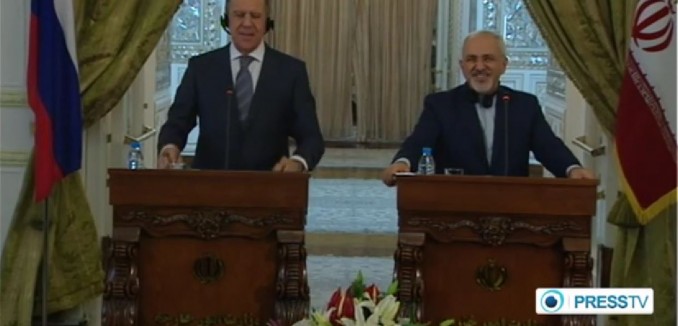Analysts and journalists continued on Tuesday to unpack the potential implications of a planned oil-for-goods program between Iran and Russia, after the $20 billion sanctions-busting barter agreement reemerged last week as a controversy in the wake of a Reuters report. Reuters had outlined some details of the deal last January, assessing that it “would enable Iran to lift oil exports substantially, undermining Western sanctions” and quoting Rep. Eliot Engel (D-NY) declaring that the “reckless and irresponsible move raises serious questions about Russia’s commitment to ending Iran’s pursuit of nuclear weapons.”
Both concerns – regarding the robustness of international restrictions on Iran and the potential for Moscow to undermine negotiations – have since then deepened. Iran has for five straight months exceeded the amount of oil it is allowed to export under the terms of the Joint Plan of Action (JPA), and on Monday Sens. Bob Menendez (D-NJ) and Mark Kirk (R-IL) sent a letter [PDF] to President Barack Obama arguing that further moves by the Islamic Republic that violate the JPA should move Washington to action:
Recent reports, however, suggest that Iranian oil sales have remained above one million barrels per day for five straight months. Even more alarming, Reuters reported last week that Iran and Russia are making progress toward a $20 billion barter arrangement that would breach the JPA and significantly undermine U.S. sanctions by increasing Iran’s daily exports of crude oil by as much as fifty-percent. We are further alarmed by reports that the barter agreement may provide for the transfer to Iran of items of significant value to Iran’s military and its nuclear program.
If Iran moves forward with this effort to evade U.S. sanctions and violate the terms of oil sanctions relief provided for in the JPA, the United States should respond by re-instating the crude oil sanctions, rigorously enforcing significant reductions in global purchases of Iranian crude oil, and sanctioning any violations to the fullest extent of the law.
Meanwhile fears have been building that White House assurances regarding Russia’s willingness to “compartmentalize” the crisis in Ukraine – that is, to insulate the spike in Western-Russian tensions from Iran talks – may have been over-optimistic. The Daily Beast on Tuesday assessed that “if the pressure mounts on Moscow, then the West may end up paying the price for punishing Russia, at the bargaining table with Iran,” and that the Kremlin may use the oil-for-goods scheme not just to undermine sanctions in general but more specifically to provide Iran with “super-sophisticated, bomber-killing” S-300 missiles “that could defend its centrifuges and reactors from allied air strikes.”
The Washington Free Beacon on Tuesday also reported on potential weapons-related implications of the deal:
Tehran and Moscow are in the last stages of finalizing the trade deal, which would provide Russia with half-a-million barrels of Iranian oil a day. The deal would boost Iranian exports by as much as 50 percent a day, according to experts.
The trade deal could open the floodgates between the two nations and has sparked concerns that the trade pact will open a “channel for the transfer of sanctioned nuclear equipment or military hardware to Iran, not to mention other illicit financial transactions,” according to Mark Dubowitz, executive director of the Foundation for Defense of Democracies (FDD).
[Photo: Press TV / YouTube]




